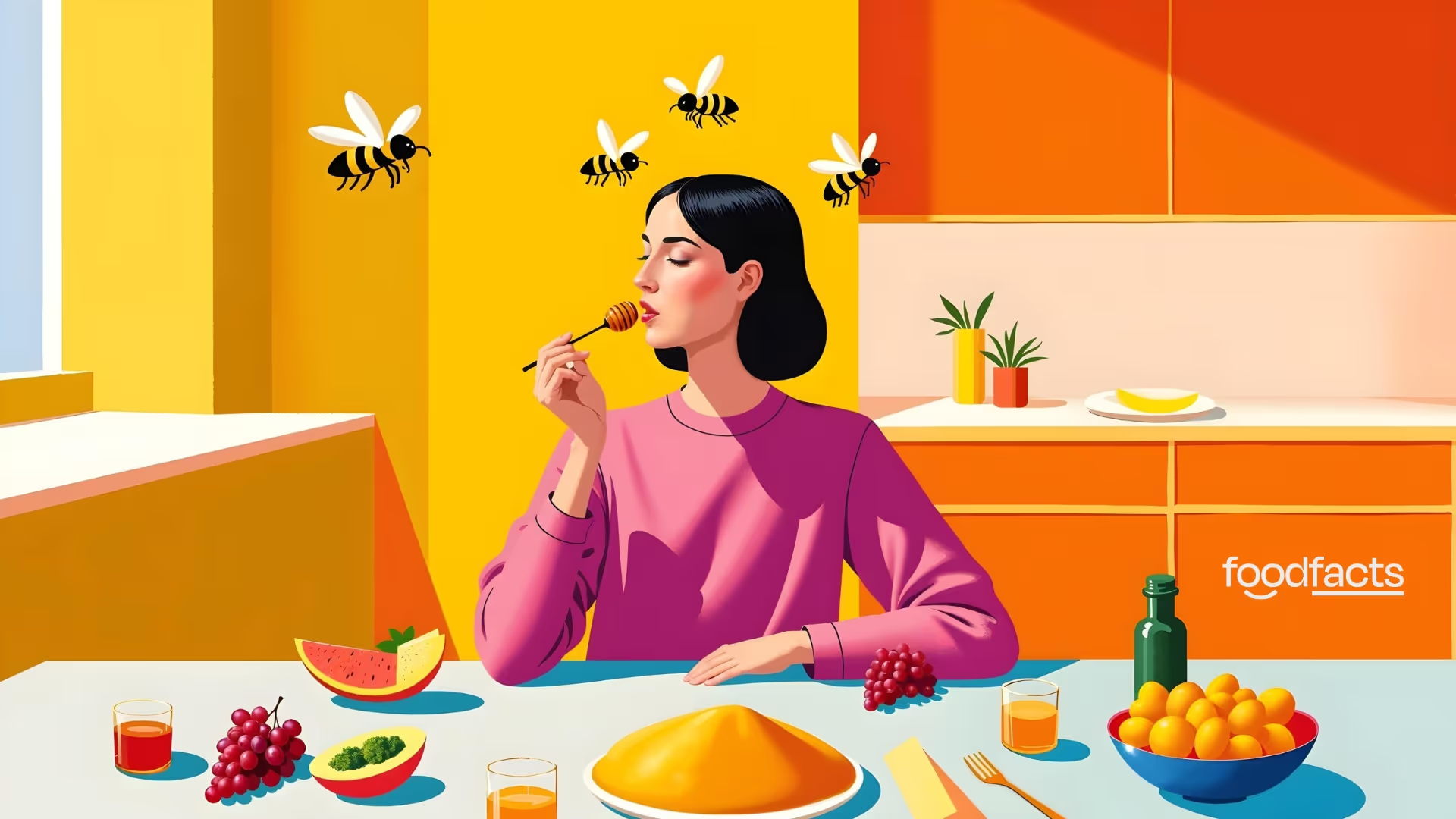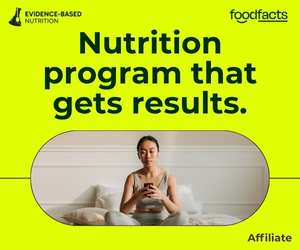
No, honey isn’t unhealthy because it spikes your blood sugar, but why does this influencer say the opposite?





Coral Red: Mostly False
Orange: Misleading
Yellow: Mostly True
Green: True
Learn more about our fact-checking policies
On 22nd January, Jessie Inchauspé, aka the ‘Glucose Goddess’ published an Instagram reel comparing half a blueberry to a teaspoon of honey, and the way they affect your health. She said “Honey is sugar, it contains a lot, a lot of sugar, it will spike your glucose levels,” followed by “Health benefits don’t outweigh all of the sugar that it contains and the impact of that sugar on your health." We bring a much-needed reality check to these claims, because frankly, who eats half a blueberry or a teaspoon of honey alone?
Comparisons between honey and blueberries are overly simplistic. They present a false equivalence and have little meaning for your health.
This claim is an example of fear-mongering at its best. Posts like this often strip away context to fit with a narrative, positioning the influencer’s programme or product as the ultimate solution.

Beware of oversimplified claims online, especially those that focus exclusively on your glucose response to a food to determine its impact on health. These claims often miss the wider context of how that food can contribute to a healthy diet.
Blueberries might contain more antioxidants, but it’s not the only measure that matters.
It’s true that the antioxidant content of blueberries is generally much higher than that of honey, as reported in the Antioxidant Food Database. However, even this can vary a lot, depending on the variety of blueberry and the variety of honey. While Jessie is likely making a general comparison to show that the amount of antioxidants in honey can be found elsewhere for less sugar, her subsequent claims about health impacts are misleading. Sugar and antioxidants are just two factors of a complex food matrix that exists within honey, and your overall dietary pattern.
Yes, sugar spikes your blood glucose, but this doesn’t mean honey is bad for you.
“Honey contains glucose and fructose - these both have impacts on your health.” Jessie writes in her caption.
A diet rich in simple sugars can increase calorie intake beyond needs and is associated with negative health outcomes such as poor cardiovascular health. As with most of Jessie’s posts, she claims that because a food is high in sugar, it spikes blood sugar and is, therefore, not healthy. However, will a teaspoon of honey, poured over a bowl of porridge, spread on your toast, or paired with Greek yoghurt, cause these ill-healths? No, and this is where Jessie’s claim is flawed.
Pure honey may have health benefits that cannot be understood by examining the blood sugar spike alone. For example, honey contains trace amounts of bioactive compounds with potential antimicrobial and anti-inflammatory effects, depending on the source. Jessie also cites no research to show that honey is associated with poor health outcomes and doesn’t acknowledge the studies that show it may have health benefits.
Honey may confer some small but beneficial effects on your health. A meta-analysis of 18 controlled trials with 1105 participants suggests that honey might improve glycemic control and lipid levels. However it’s important to note that the certainty of the evidence is low, and the effects on fasting glucose and total cholesterol varied by floral source and honey processing. Meta-analyses like these are more reliable data sources than measurements of glucose spikes from an individual, whose health background is completely unknown.
Honey probably has varying impacts on your blood glucose levels.
The graph in Jessie’s post is based on one person’s blood sugar response to honey, most likely recorded using a continuous glucose monitor (CGM). It shows that a teaspoon of honey causes a spike in blood sugar, which then falls back within the normal range. It is important to note that no citations are given for this illustrated graph and in reality there is variation between the type of honey consumed with some varieties considered to be low GI in comparison to glucose.
Even so, this graph may have little meaning for your own health. Research shows that blood sugar spikes, measured with CGMs, can vary greatly in the same person in response to consuming the same meal at different times. So, the one data point Jessie shares has limited meaning for your own health. Another paper showed that CGMs are highly unlikely to be able to tell you what foods are “right” or “wrong” for you based on the glucose response to that food.
Additionally, there is limited evidence for the negative impact of glucose spikes that fall back within the normal range on long-term health.
An important distinction here is for people with pre-diabetes or diabetes, where blood sugar control is important and should be monitored with the support of a healthcare team.
We need context, Jessie!
Context, context, context.
Jessie compares a teaspoon of honey to half a blueberry, focusing on the sugar and antioxidant content, and the impact on blood sugar spikes. However, honey is rarely consumed by itself, and is often added to meals. Therefore, the impact on blood glucose spikes (which may have little impact for individuals without diabetes anyway) is likely different to what she shares in her post. There are several ways in which context needs to be reintroduced here:
- Focusing on realistic eating patterns
Posts like this entirely remove single ingredients or foods from the context of how they’re actually consumed, and more generally of a person’s diet.
Jessie does point out, “So to me, honey is in the category of eating it for pleasure if you love it, but its health benefits don’t outweigh all of the sugar that it contains and the impact of that sugar on your health.”
Half a blueberry is also an unlikely serving size for anyone. Blueberries are consumed as a snack or in larger quantities (e.g., a handful), where their antioxidant benefits are cumulative, and they contain more sugar – which, we can’t stress enough, is not inherently bad for you!
This post is yet another example of a false equivalence, where two foods are presented together in a way that makes them seem equivalent, when in fact they cannot be compared in a meaningful way. Comparing the nutritional impact of a teaspoon of honey to half a blueberry doesn't align with real-world usage patterns and creates an unrealistic framing of their roles in a diet. This type of information might make compelling social media content, but it does little to empower the consumer to gain a better understanding of nutrition.
- A teaspoon of honey is not just a teaspoon of sugar
“Sugar is sugar”, Jessie writes in her post, which is frequently said by those claiming all sugar is unhealthy, no matter the dietary source. And while too much sugar, in the context of an unhealthy diet, can negatively impact health, the argument can be misleading without added context.
For example, one review reports that different sources of dietary sugars can impact glycaemic control, blood pressure, inflammation, and acute appetite differently. Specifically, they found that compared with sugar-sweetened beverages, honey reduced fasting glucose levels.
Dr Idz commented on this exact issue, in an interview given to BBC Radio London, in which he explains that what we need to focus on is what the sugar is added to. What else does it come with?
Sugar is the same molecule, but the question is what ‘package’ is the sugar involved with? [...] Whilst it's important to educate people about the long-term effects of excessive sugar consumption, sugar’s not ‘the devil’; the problem is excessive sugar, not sugar that exists naturally within foods.
This perspective highlights the need to ask the right questions when we navigate online nutrition information. When we focus on biological processes like blood sugar spikes, without the wider context in which they affect human health, we end up with sensationalised statements like Dr Gundry’s, who once claimed that if you feed your child grapes, you might as well give them a chocolate Hershey’s bar instead, because they both contain sugar. Comments like these do little to improve our understanding of nutrition; they create scaremongering and can contribute to negative and harmful relationships with food.
As a medical expert, I see firsthand the confusion caused by oversimplified comparisons like ‘grapes versus candy bars.’ While it’s true that sugar content matters, nutrition is about more than just isolated macronutrients. Grapes, for instance, provide antioxidants, fiber, and hydration—benefits absent in processed candy.
Alarmist statements can distort public understanding, emphasizing fear over facts and contributing to unhealthy relationships with food.When engaging with nutrition information online, I recommend a three-step approach: verify the credibility of the source, evaluate the broader nutritional profile of foods, and consult professionals for nuanced advice. Misleading claims, when amplified, undermine trust in science and make it harder for individuals to make informed choices about their health.
Addressing Nutrition Misinformation on Social Media
To fully understand the impact of misleading social media posts on nutrition topics, what we need to ask ourselves is: what questions do these posts get us to focus on? And perhaps more importantly, what do they leave out? For a detailed analysis of the long-term impact of similar posts on our overall reasoning about nutrition and on our relationship with food, you can read our other fact-check of a claim comparing smoothies with 19 doughnuts here. Indeed the example presented in this article is not isolated; it is part of a broader trend on social media. Repeated exposure to similar content is what can end up affecting the way we approach food and nutrition.
_______
We have contacted Jessie Inchauspé and are awaiting a response.
Disclaimer
The information provided here is for general information purposes only, and should not be considered medical advice. If you have Type 1 or Type 2 diabetes or any condition requiring careful blood sugar monitoring, please consult your healthcare provider for personalised guidance tailored to your specific needs.
Stand Against Nutrition Misinformation
Misinformation is a growing threat to our health and planet. At foodfacts.org, we're dedicated to exposing the truth behind misleading food narratives. But we can't do it without your support.
📚 Sources
Deibert, P. et al. (2009). Glycaemic and insulinaemic properties of some German honey varieties. https://www.nature.com/articles/ejcn2009103
Hengist, A. et al. (2025). “Imprecision nutrition? Intraindividual variability of glucose responses to duplicate presented meals in adults without diabetes.” https://www.sciencedirect.com/science/article/pii/S0002916524008141
Wolever, T. MS. (2025). “Personalized nutrition by prediction of glycemic responses: garbage in → garbage out.” https://ajcn.nutrition.org/article/S0002-9165(24)00874-8/fulltext
Carlsen, MH. et al. (2010). The Antioxidant Food Table. https://retinafoundation.org/wp-content/uploads/2016/02/Antioxidants-in-Foods.pdf
Ahmed, A. (2023). “Effect of honey on cardiometabolic risk factors: a systematic review and meta-analysis.” https://pubmed.ncbi.nlm.nih.gov/36379223/
Gonzalez, J.T. (2024). “Are all sugars equal? Role of the food source in physiological responses to sugars with an emphasis on fruit and fruit juice.” https://link.springer.com/article/10.1007/s00394-024-03365-3#:~:text=The%20type%20and%20amount%20of,sources%20compared%20within%20this%20review.



foodfacts.org is an independent non-profit fact-checking platform dedicated to exposing misinformation in the food industry. We provide transparent, science-based insights on nutrition, health, and environmental impacts, empowering consumers to make informed choices for a healthier society and planet.

Was this article helpful?


















.svg)
